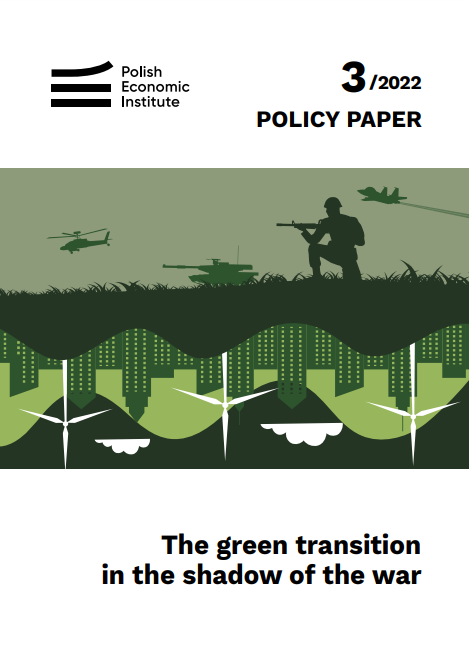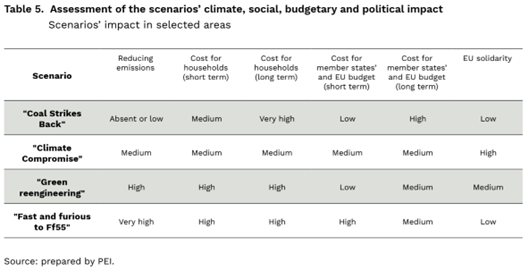The departure from Russian fuels will save the EU EUR 100 billion per year

Published: 08/12/2022
As late as 2020, 44 per cent of coal, 45 per cent of natural gas and 25 per cent oil imported to the EU came from Russia. In the energy transition vision adopted by the European Union in the Fit for 55 package, natural gas was meant to serve as a transition fuel. After Russia’s aggression against Ukraine and sharp increases in the prices of all energy raw materials, the model needed to be changed. In May 2022, the European Commission published the REPowerEU plan, assuming the diversification of gas supplies, increased energy production from RES and the development of the hydrogen and biofuel markets. At the same time, the European Commission estimates that the departure from Russian fuels will provide savings of around EUR 100 billion per year. In its policy paper entitled ‘The green transition in the shadow of the war’, the Polish Economic Institute prepared four potential scenarios of the impact of the war in Ukraine and the resulting energy crisis on the European Union’s climate policy, including the future development of the Fit for 55 package.
In the first three quarters of 2022, the EU Member States increased energy production from hard coal by 13 per cent compared to the corresponding period in 2021. At the same time, energy production from RES rose by 27 per cent in the case of solar energy and by 11 per cent for onshore wind farms. Due to nuclear power plant shut-downs in Germany and technical problems at French power plants, nuclear power generation dropped by 16 per cent in the period in question. Poland was the only major producer of electricity in the EU that, despite the difficulties, was able to increase energy production from RES and to cut electricity generation at gas- and coal-fired power plants.
‘Russia’s invasion of Ukraine and the prospect of a long-term energy crisis have been forcing the EU to rethink the direction of its energy transition. The European energy sector should be considered from three main angles: ensuring a stable energy transition that guarantees the security of supply, reducing greenhouse gas emissions and protecting households at risk of energy poverty and European economies’ competitiveness’, says Marcelina Pilszyk, an analyst at the climate and energy team.
In its policy paper entitled ‘The green transition in the shadow of the war’, the Polish Economic Institute presents four scenarios of the impact of the war in Ukraine on EU climate policy:
- ‘Coal Strikes Back’. The scenario assumes the suspension or abandonment of climate targets and a long-term return to producing energy from coal.
- ‘Climate Compromise’. The scenario assumes that the EU Member States decide to temporarily return to generating energy from coal and nuclear power, while maintaining climate targets.
- ‘Green reengineering’. The scenario assumes maintaining climate targets and simultaneously accelerating the process of issuing permits to invest in RES, thereby increasing installed capacity.
- ‘Fast and furious to Fit for 55’. The scenario assumes the acceleration of the energy transition and the toughening of climate targets.
‘In the context of the energy crisis linked to the increased cost of gas and electricity, finding a solution that will be broadly accepted by the public and will ensure a lasting international consensus at the same time is key to EU cohesion. Already in the winter of 2022–2023, policy-makers will face energy shortfalls; therefore, today’s overriding goals include ensuring that gas storage facilities in Europe are filled to the highest level possible and keeping the nuclear power plants in Germany and Belgium operational, while reducing energy consumption and investing in energy efficiency’, emphasises Kamil Lipiński, a senior analyst at the climate and energy team.
***
The Polish Economic Institute is a public economic think-tank dating back to 1928. Its research primarily spans macroeconomics, energy and climate, foreign trade, economic foresight, the digital economy and behavioural economics. The Institute provides reports, analyses and recommendations for key areas of the economy and social life in Poland, taking into account the international situation.
Media contact:
Ewa Balicka-Sawiak
Press Spokesperson
T: +48 727 427 918
E: ewa.balicka@pie.net.pl
Kategoria: Analysis / Climate and Energy / Press releases / Report / Reports 2022






